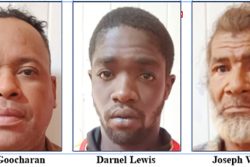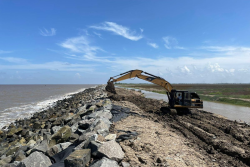Home Affairs Minister Clement Rohee yesterday distanced himself from the transfer and promotion of the junior officer who had given the authorization to fire on A Partnership for National Unity (APNU) protestors, stressing that it was an internal affair.
“I think police have taken note of my views on the matter based on a statement that I made and I know that Mr Watts has been transferred to West Coast, what we call ‘D’ Division and the others who were involved remain where they were at the time of the shooting,” he said at a news conference. The minister added that he had nothing new to report on the matter.
Police in a January 6 press release stated that Superintendent Errol Watts was posted to ‘D’ Division as second-in-charge. Previously, the release said, he was third-in-command of ‘A’ Division.
Asked about the transfer and promotion, Rohee made it clear that he does not “usually” get involved in the internal matters of promotion in the force.
He explained that at the officer level promotions are dealt with by the Police Service Commission and at the lower level by the Police Promotions Board.”The minister wouldn’t get involved,” he stressed.
Among those who sustained pellet wounds during the December 6 incident were APNU MPs Joan Baveghems, 69 and James Bond, APNU member and former army chief-of-staff Edward Collins and a seven-year-old boy.
Collins, in a recent interview with this newspaper, said he found the promotion of the rank most reprehensible, as one would have expected that he would have been put under the microscope instead of being promoted so soon after the incident.
“I see this [the promotion] as a contempt for all the people who suffered,” he had said.
The Ministry of Home Affairs has made it clear that it had not instructed the use of rubber bullets against protesters and had called on the police top brass to discuss the issue, pointing out that a junior rank had given the authorization to fire which was a very important decision.
Rohee had said that he was informed “that in light of the circumstances on the ground at the time… the Unit Commander …took the decision himself [to fire the rubber bullets] without consulting the Divisional Commander or the Commissioner of Police.”
The minister conveyed his concern about this “serious lapse” and urged the commissioner to put steps in place for “other best practices in respect of crowd control, the necessary corrective administrative and command control measures to avoid a repetition of the unfortunate turn of events.”
Rohee had also flayed the police for shooting the protesters in the back.






